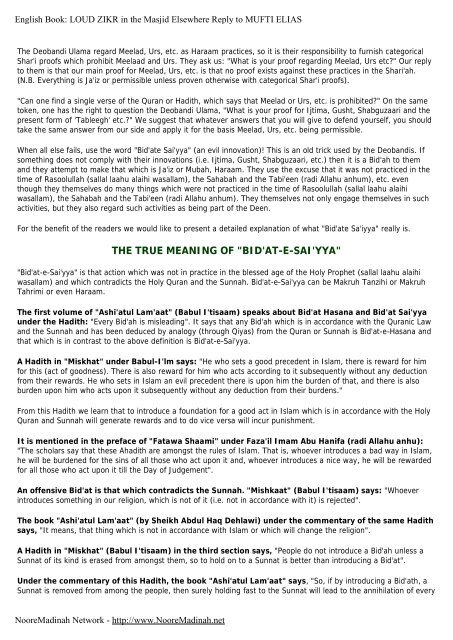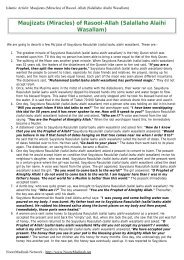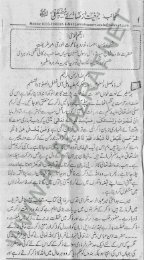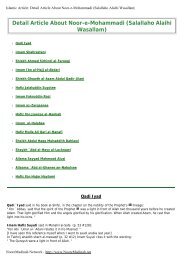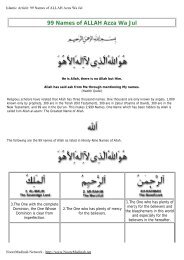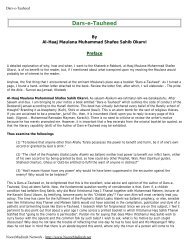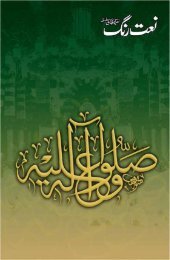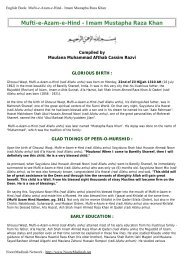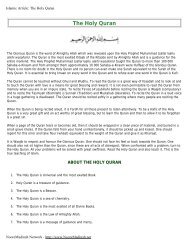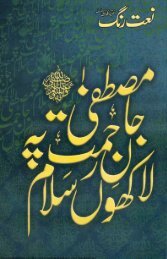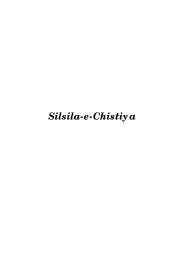LOUD ZIKR in the Masjid & Elsewhere & Reply to MUFTI ELIAS
LOUD ZIKR in the Masjid & Elsewhere & Reply to MUFTI ELIAS
LOUD ZIKR in the Masjid & Elsewhere & Reply to MUFTI ELIAS
You also want an ePaper? Increase the reach of your titles
YUMPU automatically turns print PDFs into web optimized ePapers that Google loves.
English Book: <strong>LOUD</strong> <strong>ZIKR</strong> <strong>in</strong> <strong>the</strong> <strong>Masjid</strong> <strong>Elsewhere</strong> <strong>Reply</strong> <strong>to</strong> <strong>MUFTI</strong> <strong>ELIAS</strong><br />
The Deobandi Ulama regard Meelad, Urs, etc. as Haraam practices, so it is <strong>the</strong>ir responsibility <strong>to</strong> furnish categorical<br />
Shar'i proofs which prohibit Meelaad and Urs. They ask us: "What is your proof regard<strong>in</strong>g Meelad, Urs etc?" Our reply<br />
<strong>to</strong> <strong>the</strong>m is that our ma<strong>in</strong> proof for Meelad, Urs, etc. is that no proof exists aga<strong>in</strong>st <strong>the</strong>se practices <strong>in</strong> <strong>the</strong> Shari'ah.<br />
(N.B. Everyth<strong>in</strong>g is Ja'iz or permissible unless proven o<strong>the</strong>rwise with categorical Shar'i proofs).<br />
"Can one f<strong>in</strong>d a s<strong>in</strong>gle verse of <strong>the</strong> Quran or Hadith, which says that Meelad or Urs, etc. is prohibited?" On <strong>the</strong> same<br />
<strong>to</strong>ken, one has <strong>the</strong> right <strong>to</strong> question <strong>the</strong> Deobandi Ulama, "What is your proof for Ijtima, Gusht, Shabguzaari and <strong>the</strong><br />
present form of 'Tableegh' etc.?" We suggest that whatever answers that you will give <strong>to</strong> defend yourself, you should<br />
take <strong>the</strong> same answer from our side and apply it for <strong>the</strong> basis Meelad, Urs, etc. be<strong>in</strong>g permissible.<br />
When all else fails, use <strong>the</strong> word "Bid'ate Sai'yya" (an evil <strong>in</strong>novation)! This is an old trick used by <strong>the</strong> Deobandis. If<br />
someth<strong>in</strong>g does not comply with <strong>the</strong>ir <strong>in</strong>novations (i.e. Ijtima, Gusht, Shabguzaari, etc.) <strong>the</strong>n it is a Bid'ah <strong>to</strong> <strong>the</strong>m<br />
and <strong>the</strong>y attempt <strong>to</strong> make that which is Ja'iz or Mubah, Haraam. They use <strong>the</strong> excuse that it was not practiced <strong>in</strong> <strong>the</strong><br />
time of Rasoolullah (sallal laahu alaihi wasallam), <strong>the</strong> Sahabah and <strong>the</strong> Tabi'een (radi Allahu anhum), etc. even<br />
though <strong>the</strong>y <strong>the</strong>mselves do many th<strong>in</strong>gs which were not practiced <strong>in</strong> <strong>the</strong> time of Rasoolullah (sallal laahu alaihi<br />
wasallam), <strong>the</strong> Sahabah and <strong>the</strong> Tabi'een (radi Allahu anhum). They <strong>the</strong>mselves not only engage <strong>the</strong>mselves <strong>in</strong> such<br />
activities, but <strong>the</strong>y also regard such activities as be<strong>in</strong>g part of <strong>the</strong> Deen.<br />
For <strong>the</strong> benefit of <strong>the</strong> readers we would like <strong>to</strong> present a detailed explanation of what "Bid'ate Sa'iyya" really is.<br />
THE TRUE MEANING OF "BID'AT-E-SAI'YYA"<br />
"Bid'at-e-Sai'yya" is that action which was not <strong>in</strong> practice <strong>in</strong> <strong>the</strong> blessed age of <strong>the</strong> Holy Prophet (sallal laahu alaihi<br />
wasallam) and which contradicts <strong>the</strong> Holy Quran and <strong>the</strong> Sunnah. Bid'at-e-Sai'yya can be Makruh Tanzihi or Makruh<br />
Tahrimi or even Haraam.<br />
The first volume of "Ashi'atul Lam'aat" (Babul I'tisaam) speaks about Bid'at Hasana and Bid'at Sai'yya<br />
under <strong>the</strong> Hadith: "Every Bid'ah is mislead<strong>in</strong>g". It says that any Bid'ah which is <strong>in</strong> accordance with <strong>the</strong> Quranic Law<br />
and <strong>the</strong> Sunnah and has been deduced by analogy (through Qiyas) from <strong>the</strong> Quran or Sunnah is Bid'at-e-Hasana and<br />
that which is <strong>in</strong> contrast <strong>to</strong> <strong>the</strong> above def<strong>in</strong>ition is Bid'at-e-Sai'yya.<br />
A Hadith <strong>in</strong> "Miskhat" under Babul-I'lm says: "He who sets a good precedent <strong>in</strong> Islam, <strong>the</strong>re is reward for him<br />
for this (act of goodness). There is also reward for him who acts accord<strong>in</strong>g <strong>to</strong> it subsequently without any deduction<br />
from <strong>the</strong>ir rewards. He who sets <strong>in</strong> Islam an evil precedent <strong>the</strong>re is upon him <strong>the</strong> burden of that, and <strong>the</strong>re is also<br />
burden upon him who acts upon it subsequently without any deduction from <strong>the</strong>ir burdens."<br />
From this Hadith we learn that <strong>to</strong> <strong>in</strong>troduce a foundation for a good act <strong>in</strong> Islam which is <strong>in</strong> accordance with <strong>the</strong> Holy<br />
Quran and Sunnah will generate rewards and <strong>to</strong> do vice versa will <strong>in</strong>cur punishment.<br />
It is mentioned <strong>in</strong> <strong>the</strong> preface of "Fatawa Shaami" under Faza'il Imam Abu Hanifa (radi Allahu anhu):<br />
"The scholars say that <strong>the</strong>se Ahadith are amongst <strong>the</strong> rules of Islam. That is, whoever <strong>in</strong>troduces a bad way <strong>in</strong> Islam,<br />
he will be burdened for <strong>the</strong> s<strong>in</strong>s of all those who act upon it and, whoever <strong>in</strong>troduces a nice way, he will be rewarded<br />
for all those who act upon it till <strong>the</strong> Day of Judgement".<br />
An offensive Bid'at is that which contradicts <strong>the</strong> Sunnah. "Mishkaat" (Babul I'tisaam) says: "Whoever<br />
<strong>in</strong>troduces someth<strong>in</strong>g <strong>in</strong> our religion, which is not of it (i.e. not <strong>in</strong> accordance with it) is rejected".<br />
The book "Ashi'atul Lam'aat" (by Sheikh Abdul Haq Dehlawi) under <strong>the</strong> commentary of <strong>the</strong> same Hadith<br />
says, "It means, that th<strong>in</strong>g which is not <strong>in</strong> accordance with Islam or which will change <strong>the</strong> religion".<br />
A Hadith <strong>in</strong> "Miskhat" (Babul I'tisaam) <strong>in</strong> <strong>the</strong> third section says, "People do not <strong>in</strong>troduce a Bid'ah unless a<br />
Sunnat of its k<strong>in</strong>d is erased from amongst <strong>the</strong>m, so <strong>to</strong> hold on <strong>to</strong> a Sunnat is better than <strong>in</strong>troduc<strong>in</strong>g a Bid'at".<br />
Under <strong>the</strong> commentary of this Hadith, <strong>the</strong> book "Ashi'atul Lam'aat" says, "So, if by <strong>in</strong>troduc<strong>in</strong>g a Bid'ath, a<br />
Sunnat is removed from among <strong>the</strong> people, <strong>the</strong>n surely hold<strong>in</strong>g fast <strong>to</strong> <strong>the</strong> Sunnat will lead <strong>to</strong> <strong>the</strong> annihilation of every<br />
NooreMad<strong>in</strong>ah Network - http://www.NooreMad<strong>in</strong>ah.net


